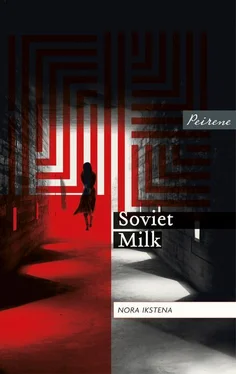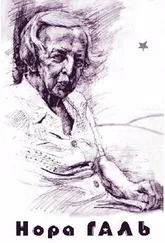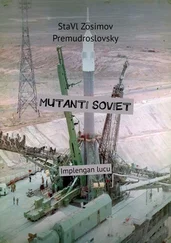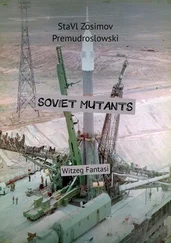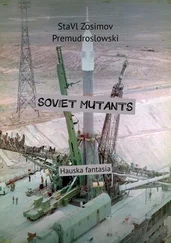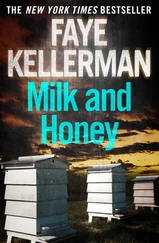*
When my mother returned from Leningrad, suddenly she no longer had work. She was withdrawn. She only emerged to make coffee or tea. Our lives went on in two parallel worlds. In our room the morning started early. My step-grandfather prepared breakfast, my grandmother ironed my school uniform and braided my hair. I organized my school books, notebooks, pencil case and pencils, fountain pen and rubber. Then my grandmother accompanied me to school, holding my hand all the way.
I studied hard but always counted the hours until school was over and my step-grandfather would be waiting for me outside. He was noticeably older than the other parents, but he was always handsomely dressed and distinguished-looking, being so tall. Walking home from school, we often lingered about the queues at the meat and dairy shops, in the hope of picking something up there, ‘thrown out’ as if to animals, as we used to say in those lean years. Afterwards we would stop again, to queue at the kiosk for the evening newspaper. Only then would we go home to sausages with potatoes and sauerkraut.
In the evenings the television would be on. It informed us in Russian and Latvian about the thriving country in which we lived. My grandmother hung on every word of our great leader Leonid Ilyich Brezhnev’s long speeches. She was convinced that Brezhnev had ill-fitting dentures. She claimed to be afraid that they might fall out of his mouth.
Occasionally on these evenings I went to see my mother in her room. It was filled with books, piles of papers, dirty cups and ashtrays overflowing with cigarette butts. Apathetic and bored, my mother would be sitting on her bed, flipping through notes. She paid little attention to her visitor from next door. I would sit for a while, looking at her and her room, then quietly leave.
I remember the afternoon when, instead of my stepgrandfather, I found my mother waiting for me. She kissed me, took my school bag and told me that we were going to the market. We almost never shopped in the market because everything there was expensive. Dark-skinned men displayed large suitcases full of wonders: fragrant yellow melons, avocados, bunches of white grapes and orange fruits which they called hurma –persimmons. My mother allowed me to choose whatever I desired. I chose two avocados, a persimmon and a handful of some nuts – my mother said these were edible chestnuts and I thought this incredible.
This market day was so different from our usual days. After buying our foreign fruit, my mother sat me down at a table in the market café. She ordered hot chocolate for two and asked me if I would like to go to the country with her. She had been offered a job at a small ambulatory health-care centre. It would be good for us both – to have a little house of our own, a garden and possibly a cat or a dog. I sat holding my bag of fruit and with childish rapture tried to envisage this brand-new, lovely life. But what about my grandparents?
‘You’ll come to visit them as often as you wish,’ my mother said.
Walking back, the nearer we came to our home, the more impossible this opportunity seemed. In the kitchen I saw them both, visibly devastated. Obviously my mother had already talked to them. She left the three of us alone. We hugged each other and cried. It couldn’t be helped.
*
While I was supplementing my studies in Leningrad, I stayed at Larisa Nikolayevna’s old-fashioned flat on Neva Prospect. The old woman turned my fantasy world into reality. She refused to call St Petersburg Leningrad and remembered not only, as she said, bylaya roskosh – the times of former grandeur – but also the time of the city blockade, when people had to eat newspapers and glue. She wasn’t interested in medicine, but in the evenings she could talk for hours about Yesenin. She did not consider him a great poet, but the rumours of his disappearance or death interested her. ‘Thus many of ours have disappeared,’ she would say.
I wasn’t interested in conspiracy theories. In the mornings I went to the Institute. There I met up with my Russian female colleagues, who survived on coffee, cigarettes, caffeine ampoules and boiled beetroot. They dressed in thick pullovers and wide trousers, sported boyish haircuts and were obsessed with deciphering the mysteries of fertility and infertility. They conversed in an intelligent Russian, now and then interspersed with robust swear words. In the evenings they drank diluted spirits but by morning they were fresh and attentive, bent over their microscopes.
Exhausted by endless examination of cell samples, in the evenings we sipped our spirits and pondered Brodsky’s poetry. He said that life was a pendulum which, once swung to the left, had only to swing back again. Just six years earlier he had been banished from Russia. He was now wandering somewhere on the streets of New York. In Leningrad, we shuffled along on the thin ice of freethinking.
Larisa Nikolayevna’s neighbour Serafima was a decent Russian woman who submitted to her husband’s abuse. He was a war invalid who drank and beat her. The more he hit his wife, the more she loved him. And she never lost hope of becoming a mother. Every morning and evening she would creep quietly into the pantry, where she had hidden her tiny icons and candles. There Serafima would pray to the Mother of God for a baby. She often came to visit us, always bringing a treat: cabbage-stuffed pirogi, vareniki dumplings, meat patties or borscht. We would eat in Larisa Nikolayevna’s kitchen and Serafima would sing a mournful song about a child who won’t come to its mother: ‘Miloye ditya, kak zhe ya bez tebya’ – ‘How can I be without you, my baby?’
I did not feel the same longing as Serafima. I had carried and given birth to a child, but I had no maternal instincts. Something had excluded me from this mystery, which I wanted to investigate to the very core, to discover its true nature. I disappeared for days so I wouldn’t have to feed my child. My milk was bitter: the milk of incomprehension, of extinction. I protected my child from it.
Serafima sang – and in my head an experiment was born. How to circumvent Mother Nature and snub God, whose existence I had denied in hell’s antechamber. My women colleagues at the Institute were ready to take part. But I had to convince Serafima.
Late one evening in Larisa Nikolayevna’s kitchen I described to Serafima what had to happen but was not happening in her body to create a child. I drew Serafima’s ovary and the released ovum, to which rushed a whole army of her boozing and abusing husband’s spermatozoa, which turned out to be so feeble that they couldn’t occupy Serafima’s fortress. She gazed at me with round, frightened eyes, crossed herself several times and repeated, ‘Upasi Gospodi. Upasi Gospodi’ – ‘God forbid! God forbid!’ Then I screwed up my courage and said, ‘I’m going to help your bastard of a husband in this struggle, because you want this from the very bottom of your good and pious heart.’ Serafima froze. ‘No, no, dear Serafima, it’ll be the two of you alone. I’ll just extend my doctor’s helping hand.’
Serafima thought for three days and three nights, then she made a decision. On her next fertile day, she came to meet us at the Institute. Tucked under her arm to keep it warm, she had brought her abuser’s preserved sperm. We warmed it further on our radiators, then introduced it into Serafima’s uterus. For half a day she slept in the Institute with her legs raised. Then she went home. After some time it was confirmed that she was expecting a child. She rushed into Larisa Nikolayevna’s kitchen and embraced my legs. ‘You’re a saint, a saint, a true saint!’
*
We could see the silhouette of the old town. Then the new residential districts flashed by, where people lived in identical flats with identical mats at their doors. In the mornings the indistinct mass of them streamed to their workplaces. They streamed back again in the evenings to watch the same unfathomable television broadcasts about their motherland. All this we left behind as the train passed through forests and fields, and the houses and people at the stations grew fewer. Eventually we got out at a small country station. The train disappeared whistling into the distance. Mother lit a cigarette, and our new life began.
Читать дальше
